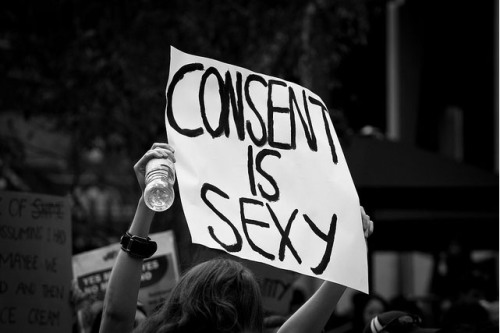Sexual consent and tackling harassment are ideal social issues for university communities to address. We know how important questions of consent are to students, and to what extent we are affected by them, considering the results of the Trinity College Dublin Students’ Union’s Sexual Consent Survey of last year that revealed the worrying extent to which students, and female students in particular, found themselves at the receiving end of unwanted contact. Discussing consent on a college-wide level is an opportunity to improve the notoriously meagre education received by young Irish people from most schools.
Consent issues become all the more pertinent in the student context. While it’s unfair to sweepingly label our generation as one of excess and diminished restraint, there is to some extent a ritualised loss of inhibition that touches most of us for the first time in our college years and that at some stage makes us ask ourselves, “Am I crossing a line here?”. Couple that with the closer-knitting of the student community through social events, student accommodation, and the fact that we share such a small urban space as a community.
However, in order for consent education to have a meaningful impact, dedication to and respect for the issue are required on the part of the entire college community. Some weeks ago, a male student at Warwick University publicly refused to go to a workshop on harassment and consent. His reasoning, which he explained in an article for a student publication, was that he considered himself already well-versed in what constituted harassment, consent and the breach thereof, and claimed that he did not “look like a rapist”. The student was “insulted” at the idea that anyone would believe he had a lapsed understanding of the OKs and not-OKs of such behaviour.
If society wants a world free of sexual harassment and violence, one cannot “opt out” of coming to terms with the issue of consent, and doing so immeasurably weakens the impact of such discussion.
On the perfect campus and in a perfect world, everyone would have the same high esteem of themselves and each other as this Warwick student did with regard to consent. We would all be confident in our ability to not breach the boundaries of safety and nonviolence and, thanks to what would be a dream curriculum of relationship and sexuality education, we would expect the same of others.The number of people feeling unsafe at night, on public transport, and in day-to-day life would fall.
But this hypothetical picture of society is not what we have today. Consent education is not something that can be merely tossed aside at one’s own judgement. If society wants a world free of sexual harassment and violence, one cannot “opt out” of coming to terms with the issue of consent, and doing so immeasurably weakens the impact of such discussion. Anyone can claim to understand consent issues profoundly as there is no real monitor for adherence: there’s no box to tick and no final exam to prove your understanding of what comprises consent. If you’re going to insist that you “don’t need to be taught not to be a rapist”, then you need to prove that outwardly rather than comforting yourself with your own confidence. Consent education is not about insulting the “good guys” – it’s about ensuring that the college community takes the safety of its students seriously. Playing a part in creating a safe environment for your fellow students doesn’t mean that anybody will think you “look like a rapist” – quite the opposite, in fact.
The question that has essentially been raised amid this fuss is whether or not any of us can truly “opt out” of confronting this issue. The Warwick student’s controversial claim begs the question: what does a rapist “look like”? There is no set answer, because a rapist doesn’t fit into some predetermined mould. With the United States’ National Institute for Justice repeating that all-too-familiar statistic that between 85 and 90 per cent of university students who are rape victims know their attacker, trust evidently doesn’t correlate with being able to feel secure.
When graduates enter society with a solidly-instilled understanding of what constitutes consent, a much greater shift in societal attitudes is possible.
Universities should be at the forefront of decisive, authoritative consent and anti-harassment education, contributing to a societal shift in attitudes towards it. Last year, the results of the Students’ Union’s much-discussed Sexual Consent Survey revealed that a quarter of the women surveyed out of 1,038 respondents had some form of unwanted sexual encounter. Evidently, consent was not something that many students could understand. In response to this, this year the union lent its support to the Ask Consent campaign co-organised by the Union of Students in Ireland, distributing information leaflets during Freshers’ Week in an attempt to raise awareness and educate students on the ins and outs of sexual consent.
Universities are a perfect environment for fostering new attitudes to consent and respect, even though schools should also be filling that role. When graduates enter society with a solidly-instilled understanding of what constitutes consent, a much greater shift in societal attitudes is possible. For this to fully materialise, however, let’s not be complacent in educating ourselves about sexual consent. In the union’s sexual consent survey only around 30 per cent of both women and men had heard about previous efforts at campaigning on the issue. Imagine how different a future survey would look if the college discussion on consent were heard and contributed to by every student, regardless of whether they “look like” some stereotypical notion or not.







